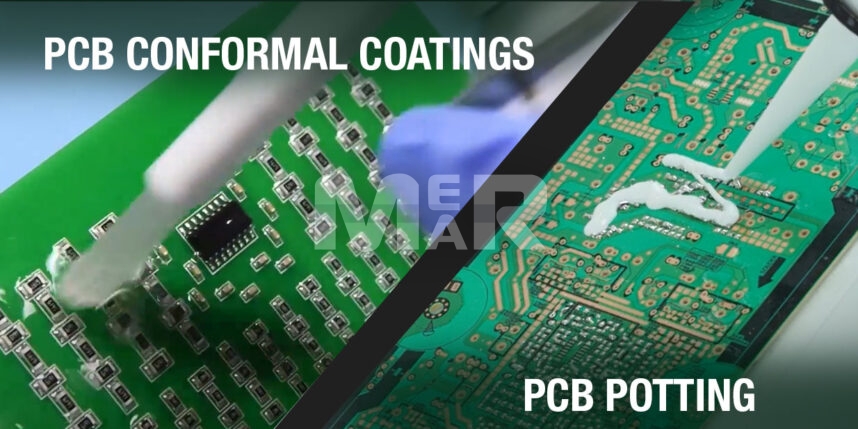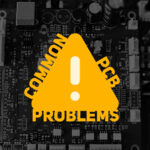What’s the Difference Between Potting PCB Board and Conformal Coatings?

With PCB being a crucial component of an electronic device, it is extremely important that it be protected against damage. There are 2 main methods in use to do so, namely:
- PCB Conformal Coating
- PCB Potting
Both these methods use organic polymers to protect the PCB. However, the 2 techniques work differently. Let us look at them in detail:
PCB Conformal Coating?
Broadly the conformal coating process involves coating the substrate with a non-conductive material. The coating can be applied either manually or through a robotic device. A light option, a conformal coating is between 25 to 250 microns. It goes a long way in offering protection against moisture, corrosion, particulate matter and more.
There are several coating materials that are available such as epoxy, silicone compounds, acrylic, parylene and more.
Potting PCB Board
It involves filling the substrate’s enclosure with a potting compound or encapsulation resin. PCB potting process is largely done for the entire circuit board but can also be done for individual components.
The big advantage with PCB potting is that it provides resistance to:
- Heat
- Chemicals
- Other Environmental Hazards
PCB Potting Material
Some of the material used for PCB potting includes
- Epoxy
- Polyurethane
- Silicone compounds.
Similarities Between PCB Potting and Conformal Coating
Essentially, both potting and conformal coating use organic polymers to protect the PCB. Some of the other points of similarity between the two include:
- Both prevent the substrate when it comes to harsh environments.
- They offer protection against corrosion.
- They shield the circuit board and improve electrical performance.
Pros and Cons of PCB Potting
Pros of Potting PCB Board
- Potting is quick and is easy to apply especially when it comes to high-volume production.
- They offer more durability as opposed to conformal coatings.
- They offer high resistance to heat, chemicals and other environmental hazards.
- They offer protection against water.
- With the use of dark-colored potting compounds, they offer design security.
Cons of Potting PCB Board
- It is far more challenging to repair a device that is protected by PCB potting, as opposed to one that is coated.
- Potting causes the weight of the PCB to increase.
- It adds to inflexibility.
- There are a number of steps that need to be followed when it comes to potting.
- It comes at an excessive cost.
Pros and Cons of PCB Conformal Coating
Pros of PCB Conformal Coating
- Since conformal coatings are thin, they work well when tolerances are tight.
- On account of their translucent quality, they work well as the item is visible.
- It offers protection against corrosion.
- It does not increase the weight of the device too much.
- It is extremely durable.
- It comes at a low cost.
- PCBs with conformal coatings aren’t challenging when it comes to repair or rework.
Cons of PCB Conformal Coating
- Coating does not offer the same level of durability as potting.
- On account of the same, it cannot offer full proof protection.
What Works Better – PCB Potting or PCB Conformal Coating?
The choice of the right option depends upon the PCB assembly application and the device’s intended use. Additionally, the conditions in which the device has to function is also an important determinant of the methodology that should be put to use. Some of the other considerations to be kept in mind include:
- The elements in the external environment that the device will be subject to.
- The design of the enclosure where the PCB will be housed
- Is there any other protection from environmental factors?
Clearly then in choosing PCB conformal coating versus PCB potting, the choice of selection will depend upon the PCB’s purpose. Elements such as durability offered as also the increase in weight are some of the crucial factors that will help you make your choice.
Use Cases
Use Cases of Potting PCB
Typically, PCB Potting works well in the following use-cases:
- Heavy-duty applications.
- High-voltage electrical devices.
- Power plants, mines, and other environments with extreme conditions.
- High-volume and high-speed production environments.
Use Cases of Conformal Coating PCB
The use cases for PCB conformal coating, on the other hand, include:
- Sensitive components and devices.
- Smartphones and other handheld electronics, since it offers a thin application and is light weight.
At Mermar Electronics, we are extremely committed to not just fabricating quality PCBs but also keeping them well-protected with our high-quality PCB conformal coating services and PCB potting services. Simply put, it is extremely important as it protects the PCB against any environmental hazards.
You could get an instant PCB quote on submitting your custom requirements. You could also write to us at sales@mermarinc.com or call us at (760) 244-6149 for nay clarifications. We will be happy to hear from you and offer bespoke solutions.








